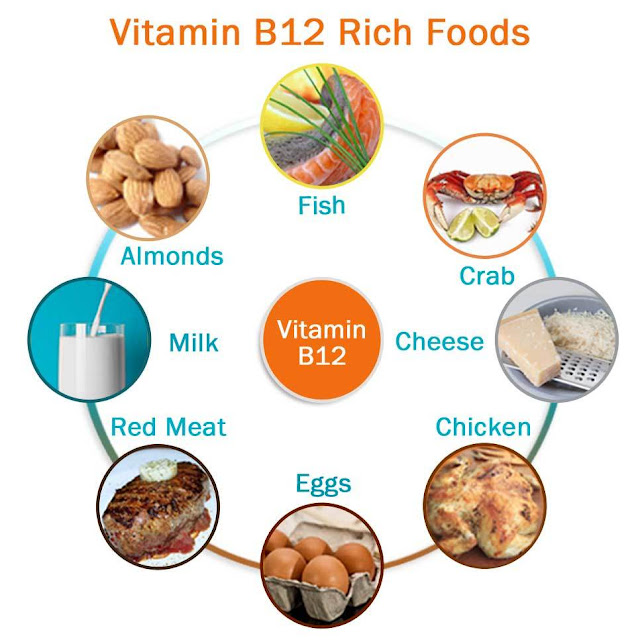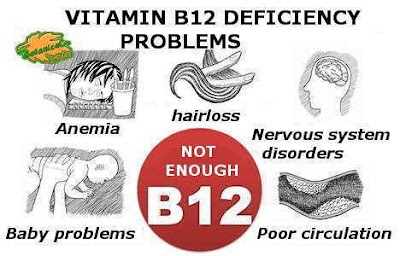What is Vitamin B12?
Vitamin B₁₂, also known as cobalamin, is a a nutrient in the vitamin B
complex that the body needs in small amounts to function and stay
healthy.
It is a water-soluble vitamin involved in metabolism. As it is Water-
soluble it dissolve in Blood Stream and Circulates, The human body can store vitamin B-12 for up to four years. Excess
unnecessary vitamin B-12 is excreted in the urine.
Metabolism is an intracellular chemical reaction that converts food into energy for the body's cells. Our body needs this energy to do everything from movement to thinking and growing.
Which foods are high in vitamin B12?
To increase the amount of vitamin B12 in your diet, eat more of foods
that contain it, such as:
- Red Meat, Fish, liver, and chicken.
- Dairy Products like Milk, yogurt, and cheese.
- Eggs.
- Almonds in Dry Fruits.
Vitamin B12 is usually found only in animal products and is one of the
most serious nutritional concerns for vegetarians and vegans. If you are
concerned about not getting enough vitamin B12, you should look for these
foods if you are Vegetarian.
Almond Milk fortified with Vitamin B12.
Coconut Milk fortified with Vitamin B12.
Soya Milk Original fortified with Vitamin B12.
Ready to eat Cereal fortified with Vitamin B12.
Though, Vegetables, Fruits and nuts do not have Vitamin B12 Naturally. You
should look For Extra Supplements available in market with the
recommendation of your Health Care Provider.
Why vitamin B-12 is important?
Vitamin B12 is a nutrient that supports the health of nerves and blood
cells and makes up the DNA, the genetic material of every cell. Vitamin B12
also helps prevent megaloblastic anemia, a type of anemia.
Deficiency and symptoms of Vitamin B-12
A lack of Vitamin B12 can cause anemia. This means that your body does
not have enough red blood cells to do its job. This can make you weak and
tired. Vitamin B12 deficiency can damage nerves and affect memory and
thinking.
What are the signs and symptoms of vitamin B12 Deficiency?
If your vitamin B12 deficiency is mild, you may not have symptoms or you
may not notice them.
As the anemia gets worse, you may have:
- Feel weak, tired, and light-headed.
- Have pale skin.
- Have a sore, red tongue or bleeding gums.
- Feel sick to your stomach and lose weight.
- Have diarrhea or constipation.
If the level of vitamin B12 stays low for a long time, it can damage
your nerve cells. If this happens, you may have:
- Numbness or tingling in your fingers and toes.
- A poor sense of balance.
- Depression.
- A decrease in mental abilities.
B12 deficiency neurological symptoms:
A lack of vitamin B12 can cause neurological problems, which
affect your nervous system, such as: memory loss, Blurred vision problems, due to Nervous System
Problem Problem in Speaking, Walking, Balancing especially in
elderly persons over 60 years old.
Causes of vitamin B12 deficiency:
Diet: People can develop a vitamin B12 deficiency as a
result of not getting enough vitamin B12 from their diet.
Factors Effecting the Stomach: Some stomach conditions or stomach operations (Surgery) can prevent
the absorption of enough vitamin B12.
Factors Effecting the intestines: Conditions that
affect your small intestine, such as Crohn's disease, celiac
disease, bacterial growth, or a parasite
Medicines: medicine sometimes used to treat
indigestion, can make a vitamin B12 deficiency worse. This
includes some heartburn medicines including proton pump inhibitors
(PPIs) such as esomeprazole, Omeprazole, Famotidine etc. and
certain diabetes medicines such as metformin
(Glucophage).
Pernicious anemia: In this anemia, your body destroys the cells in your stomach that
help you absorb vitamin B12.which makes it hard for your body to absorb vitamin
B12.
Immune system disorders: The immune system is made up
of cells, tissues, and organs that help the body fight against
infections and other diseases.
Such as: such as Graves' disease( Graves’
disease is an autoimmune condition that causes your thyroid to
become hyperactive -- work harder than it needs to), or lupus
(happens when the immune system attacks its tissues, causing
inflammation, swelling, pain, and damage. Lupus symptoms include
fatigue, joint pain, fever, and a lupus rash).
Benefits of Vitamin B12
What is the best treatment for B12 deficiency?
You can change your diet to include vitamin B12-fortified cereals, vitamin B12 supplements or injections, or if you are deficient in vitamin B12, you can take a high dose of vitamin B12 by mouth. Elderly people who are deficient in vitamin B12 may need to take B12 supplements or multivitamins containing B12 every day.Difference in cyanocobalamin and methyl cobalamin:
Vitamin B12 supplements are typically derived from two sources:
cyanocobalamin or methyl cobalamin.
Cyanocobalamin is the form of B12 most used in supplements because
it’s the cheapest and while methyl cobalamin as the superior form
both are excellent at providing nutritionally valuable quantities of
Vitamin B12 to the body.
Methyl cobalamin is the most bioavailable form of vitamin B12, that
is, it is the most easily absorbed form. In addition to this
research, it has been shown to stay longer in the body and at higher
levels than cyanocobalamin, which means that if you use methyl
cobalamin, your body will last longer than cyanocobalamin Absorb
vitamin B12 over time.



















